The music that shaped me - Selections and Interview with DJ Steve Proctor
Wednesday, September 27, 2023
by Tat
There is no disputing Steve Proctor’s influence on the British music scene, as a DJ, club and live music promoter, producer, remixer, label boss, band and artist manager, writer and champion of good music. Despite an unsettled childhood that saw him move from England to Canada a few times and eventually living with his grandparents, music became the thread that would ground him from that point on. From an early age it was clear that he had an ear for sound and a keen eye for emerging trends and embryonic scenes here in the UK and the U.S.. That early drive for discovering new music was equally matched with an unbridled passion to share it as far and wide as he could.
I asked Steve to dig into his extensive record collection and musical history to pick the tracks that shaped his formative years, right through to being a DJ, club promoter, label manager and beyond. Steve continues to DJ and produce and is currently writing a book about his life. The following interview is an abridged version of this podcast which features much more on Steve’s music career and life along with the tracks that helped shape that career. We start by going back to the early 70s and the music that were the foundations to Steve’s career.
An extended version of this interview with Steve's selections is available as a podcast and can be listened to via this link on Mixcloud.
We used to watch Top of the Pops religiously every Thursday night and one evening there was this band called Chicory Tip on with a Moog lead in their song. It was a sound like I'd never heard before and it created something quite visceral in me, the song was interesting because it really informed everything that I've ever done as a DJ subsequently. It was something about that sound and the fact that it was otherworldly and that it wasn't made by piano but still played on a keyboard. I bought that record and that basically changed my life as far as listening to music was concerned. It was years later I came to realise that it was written by Georgio Moroder and it was one of those ‘My God’ moments. It all made sense. It was a combination of a great pop song but otherworldly and there's something about twisted synthesiser noises that really got to me and still does.
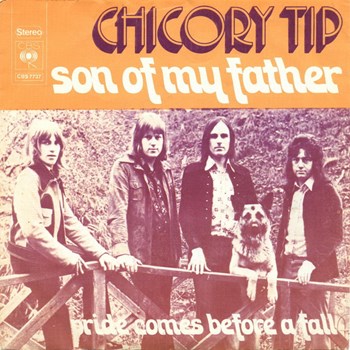
Chicory Tip - Son Of My Father
I inherited a Grundy reel to reel tape recorder and my dad had one. I thought to myself; ‘why didn't I buy more reels of tape?’ But they were expensive and my grandparents didn't know anything about buying them. So I had just this one tape and on Thursdays I would hold the microphone in front of the TV speaker and record Top of the Pops. I'd have the music from Top of the Pops on that tape until the following Sunday and put the microphone in front of the speaker of a transistor radio and record the Top 20 Charts.
Around the same time as the Chicory Tip song, on July 6th 1972 on Top of the Pops I was holding the microphone against the speaker and all of a sudden David Bowie came on. I knew who David Bowie was because I had a copy of Space Odyssey but as a young 13-year-old, fresh out of being in care and children's homes and suffering an abusive childhood; this guy on Top of the Pops appears. He performed Starman and my life changed forever. People ask: ‘What’s that got to do with DJing?’ But it's quite interesting that my first DJ gigs were ones where I was specialising in playing Roxy Music, David Bowie and other stuff that we'll talk about later on. If it wasn't for David Bowie, I probably would never have become a DJ.
When I saw Bowie, I said to my granddad, I would like my haircut like that, so he took me to the famous barbers that's mentioned in Penny Lane by The Beatles. He said to the guy: ‘Can you do Feather cuts?’ He just butchered my hair, so I said to my grandfather that I'm never going there again. I couldn't have my hair dyed because my grandparents were quite strict, but by the time I was 13 or 14, I was wearing flared blue velvet trousers with silver bells on the outside of them and platform shoes.
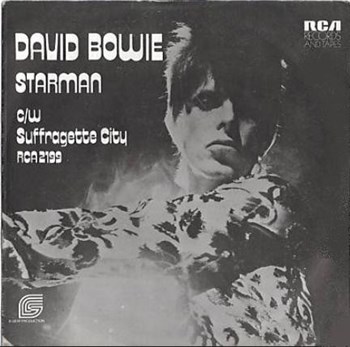
David Bowie - Starman
The next tracks were in effect me ordering my own alternative universe, as music was my safe haven from the shit I dealt with in my life. Everybody's life experiences are individual to them and I'm not saying that my life was any worse than anybody else's. I'll never compare lives, but I was seriously messed up as a teenager. I didn't have a maternal influence in my life but very dark negative influences from my dad and my stepmother. I was in foster care and didn't care, so I was ordering my own alternative universe where I was the centre of it and where I had control of it. A lot of what happened to me happens to a lot of survivors of abuse, that they feel they had no control over what was going on. I would get my own haircut, buy my own clothes, buy my own music and go in my own way.
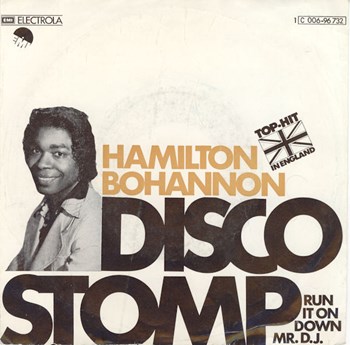
Hamilton Bohannon - Disco Stomp
Hamilton Bohannon - Foot Stomping Music
One of the next two tracks is all about a great keyboard rift to start the track again. I used to go to a lot of school, youth club and church discos. I learned very quickly that all the other lads wanted to be in gangs and fight and I just learned very quickly that I wanted to talk to girls. I was dressed really nice and I thought I'm not going to ruin my clothes by scrapping on the floor. The girls liked me because I was always dressed differently and was really quite cool. I realised that I just wanted to dance.
Then there's Hamilton Bohannon’s Disco Stomp and Foot Stomping Music. They’re a combination of incredible rhythms, great keyboard riffs and great minimal hooks. I had a paper round by that time so I used to spend all my wages on ex-jukebox records. I used to make a list of all the records that were on jukeboxes that I liked. I was 15 or 16 and would go to clubs and if I was at a disco and the DJ played a record I liked, I'd go and ask him what it was. I wouldn't hesitate to do that. I would make a note of them and when they came in off the jukeboxes, I would buy them for 15 or 25 pence each. These two tracks definitely had an influence on me as a DJ. It's a four to the floor thing, it's a shuffle chug, really dirty club sound with Disco Stomp. And again, it goes back to this whole thing about keyboards for me, with the exception of Bowie, everything else is keyboard driven pretty much.
I've been through various different styles of music and I saw Lou Reed at the Liverpool Empire in 1973 and Slade in 74 and also Bowie. I was really into the Glam thing but it's things like these Hamilton Bohannon tracks, which are just really so unique. Even at the time when everything was more glitzier, this is slowed down dirty funk with a great little hook to it as well.
I had my first job in the summer between my A levels and earning 19 pounds a week from working in a shoe shop. I also started to go to a wine bar in Liverpool called Kirkland's where I was introduced to things like Steely Dan, Bob Marley and Deaf School from Liverpool. I was starting to get introduced to this variety of sounds and then suddenly there's a guy called John Henry. He was a DJ at Kirkland's and had a place upstairs called the Baltimore Rooms which was significant with regards to Kirklands because I ended up having a night at one of their other clubs called The State. This was a residency on a Thursday night where I played to 1,000 people.
It's also where I promoted bands like New Order and Big Audio Dynamite. Kirkland's was the next part of my evolution and John was also the first DJ that I heard playing Roxy Music and David Bowie and seeing people dancing to it. All the people that we're going to Kirkland's were the people who became the glitterati of Eric's and the Punk scene. It'd be Holly Johnson, Paul Rutherford, Jayne Casey and Pete Burns among others.
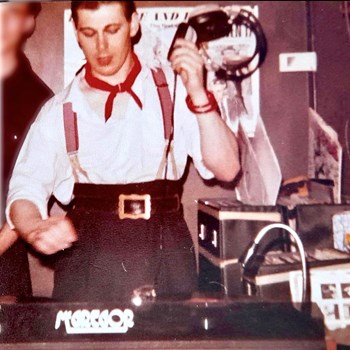
The Normal - Warm Leatherette
By December 76 I was doing my A levels but I was also humping gear at Erics in Liverpool because I was a big fit lad. I found myself going to Eric's quite regularly, and this is where I heard other stuff. John would be playing Television, Talking Heads and stuff like that. We'd be pogoing and jumping around, but people could dance to stuff as well, it seemed like the most natural progression to me from Kirkland's to the Baltimore Rooms.
The Normal was Daniel Miller expressing himself. Along with Kraftwerk, these are young guys who were just pushing the envelope to the extreme and it was everything that I wanted to be and everything I can imagine that turned me on. This immediately transforms me back to being in Eric's in 1977. Even the front cover is so punky and it's got everything you want, including a vocoder. I mean, wow, man.
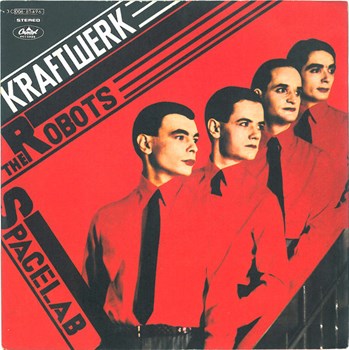
Kratfwerk - Robots
When you think back to Autobahn and stuff like Radioactivity, they were doing cool stuff but this is a combination of electronic noise, great grooves and a great hook. There's just something about it that is otherworldly. I sampled that riff at the beginning in my first record Technodelia. With Kraftwerk, it's very slick and polished but It's still very alternative; It's very original. Again that's what appealed to me, it's just that uniqueness and the fact that most people would turn their noses up at it. I was a punk, but I didn't know I was a punk and ever since everything that's come after for me has been because I'm a punk. I remember having a conversation with Andy Weatherall about it and we both shared that ethos. The two things we shared was that feeling that we were outsiders and that we were punks and we applied that sensibility to everything that we did. It’s about being a decent human being and about being open and receptive to whatever's going on and to respecting and appreciating other people's endeavours.
In July August 77 I spent a year in Israel, where I discovered things, like Joan Amatrading and Crosby, Stills, Nash & Young. I took cassettes of Lou Reed, Punk, Roxy Music, David Bowie and stuff like that. I came back with Jean-Michel Jarre as I used to swap them with people there and that was where I first heard Jean-Michel Jarre in Israel. I really got into Jazz Funk when I came back and groups like Azimuth, Bob James and Rodney Franklin. At the same time I was also buying the first Boston and Meatloaf albums because I was just trying to get into music again.
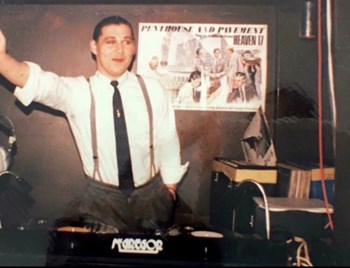
Human League - Being Boiled
I used to hang around a record shop called Penny Lane Records, which was my local record shop and it was through that I started to hear a lot of new music that I'd missed out on through being away for a year. It's where I discovered bands like Ultravox and The Human League. I found myself completely immersed in electronic music. Whilst working there I suddenly had access to this incredible catalogue of music and that's how I discovered the Human League and Visage. I heard Gary Numan, Siouxsie and the Banshees and Talking Heads. I assimilated them into my sets, due to that I was working in a record shop. Finding amazing new stuff that nobody else was playing in Liverpool and that for me is always going to be what it's about as a DJ. You've got to be searching for those records that nobody else has got, that you desperately want to share with people. Being Boiled was one of the first records I played when I started DJing in 79 because for me it was the sound of the future. It is all played on a synthesiser, including the drum track.
Visage - Tar
With Visage, I was aware of them but also because again, I went to the Blitz. I was made aware that they were making this record, so of course as soon as they made it, I ordered a copy. Rusty Egan was very heavily involved and was a very important part and a driving factor of the band. Again it's a really good groove, and that comes from Rusty being a great drummer.
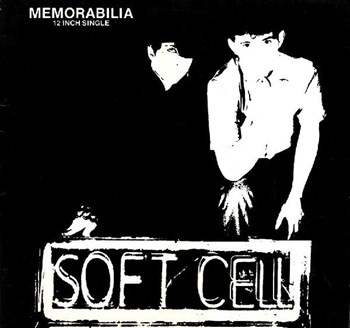
Soft Cell - Memorabilia
I'd heard Soft Cell when they released their Mutant Moments EP, which was good, but I just didn't feel it was right for my dancefloors. When memorabilia came out I was on people's mailing lists and I got sent a copy. I put it on the turntable at home and it was just like; ‘This is phenomenal’. It was everything that I liked, up tempo, four to the floor, electronic with great noises. It has great production, it was British and also it was Northern - I love the fact that it was Northern.
Everything pretty much had been quite London-centric and all of a sudden here's these two guys from The Warehouse in Leeds. He's a cloakroom guy who becomes mates with a propeller head with synthesisers and all of a sudden we get Memorabilia and it was like nothing else. It was one of those records where I'm playing this - I don't give a shit if nobody ever plays it. I'm playing this and it's gonna be a big record for me. There is actually a dub version that exists which is really heavy duty that I can't find my copy of, which is very frustrating. I've never found it on Discogs, so I don't know if it was only ever on my promo. It's completely un-embarrassed, it's unashamed. It's like this is what we're doing and if you don't like it, go f*** yourself. I remember being at High on Hope When Tony Humphries was playing and he dropped Memorabilia. I turned around to Norman Jay and said: ‘Do you know what this is?’ which he didn’t. I was the only other person in the club that knew what this record was and that just goes to show you what Tony Humphries was like. House music is exploding and a guy from New York plays Memorabilia by Soft Cell and it just blew me away.
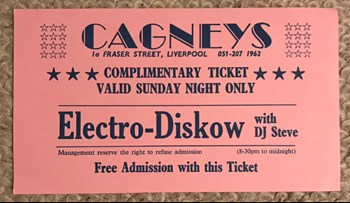
Donna Summer - I Feel Love
The reason why I've chosen Donna Summer’s I Feel Love is because it introduced me to Patrick Cowley and includes loads of live keyboards and overdubs. I bought Megatron Man on import and started buying and playing his productions and his work with Sylvester is legendary. It was his version of I Feel Love which is very particular to me because I used to play all 16 minutes of it. The great thing about working in clubs in those days was that you had five hours to play records. Weirdly enough there’s Giorgio Moroder’s production and the influence of some of my father’s music comes into it all of a sudden. These are the sort of records that can only be played when you have residencies. You can't just go out take an hour booking and start slamming them with 16 Minutes of Donna Summer and then eight minutes of Memorabilia. I've always loved residencies and that's why when I'm playing in Norwich in a few months time, I'm playing all night.
So even people who think; ‘Oh it’s Donna Summer and I Feel Love’, and then eight minutes into it; all of a sudden you are hearing things. And it's like, this is no longer Donna Summer, I Feel Love - this is Patrick Cowley interpreting Donna Summer. It goes back to that thing about educating and entertaining people. It's about introducing them to something that they would never normally hear. He's made it into a really good Ecstasy drug record and I started playing this again in my Balearic Acid House sets. It's when you get into the effects and noises - it's just mind-blowing to me.
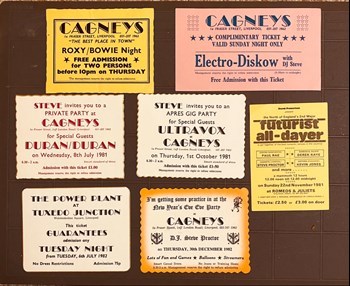
Afrika Bambaataa And The Soulsonic Force - Planet Rock
I could have picked Hip Hop Be Bop by Man Parish or Space is the Place by Jonzun Crew, but Planet Rock is the one that really broke through. The reason why I used to play it was because I knew all of my crowd would recognise the Trans Europe Express Influence in it. As soon as I heard Planet Rock I knew I had to play it. By 1980 I was hosting nights called Electro-Diskow and Planet Rock is Electro to me. Ultimately it was great that we were influencing the Americans and black Americans who particularly were super cool to us. They really did make a Post Punk alternative image for themselves in New York. we were already moving on by the time they got it and I don't say that in an arrogant way. I say that in a really proud way that it feels good to be part of a scene that influenced another movement across in America. John Robie was a big part of it and he doesn't get the credit that I think he deserves. Arthur Baker gets all the plaudits but it's really John Robie as the other musician behind it, as well as other people.
The best compliment I ever got was by Ruth Polsky who was a promoter at the Danceteria. I met Ruth at the Hacienda one night and we were talking about what I was doing at The State in Liverpool. She said that as a promoter: ‘You're doing much of what I do at the Danceteria. As a DJ, you're doing pretty much what Mark Kamin does’, and I was really humbled by that. Mark and I became friends later on because apparently she'd gone back and said to him: ‘I’ve met this guy and you really need to to get to know him’.
I was creating a safe space where people could also be part of that as well. That music was a safe space for whoever wanted to come and enjoy it with me. I'm proud to say that my crowds were always mixed LGBQT and straight and people could dress how they wanted, whatever sexuality. It was really important for me to provide creative spaces and that's been all my life and my career as a DJ. And when I became a club promoter it was important to create safe spaces for people to feel confident about embracing new and alternative and different styles of music. That's pretty much what punk’s about. For me it will always come back to punk. Eric’s was the first club where I could hear heavy Dub, good Lovers Rock, Reggae, Northern Soul, R&B, New Wave, alternative electronic and even a little bit of weird obscure Disco.
I was DJing at The State in Liverpool and I'd have a thousand people there every Thursday night. I'd play everything from Planet Rock to James Brown to The Cramps to the Sisters of Mercy, from Divine to Bobby O and everything else in between. The whole idea was when you have a thousand people there, you have to keep them all happy on a dance floor. You have to play the best of about five or six different alternative styles, genres and subgenres.
Music is about the way that people excitedly embrace it and take ownership of it, because it means so much to them. I know what I've done in my career as a DJ and in business and it's humbling to know that I've contributed to the universality of new music and pushing boundaries and creating safe spaces for people to experiment.
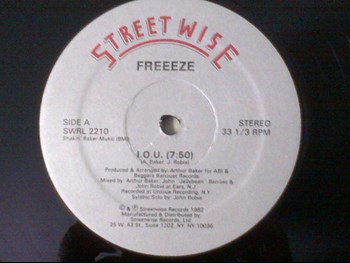
Freeez - I.O.U
Freeez was John Rocca and Andy Stennet, who was the keyboard player and the musical genius. They had a massive hit with Southern freeez, which is still a classic track, but then they disappeared. All of the sudden they reappear and it's no coincidence that it's Arthur Baker and John Robie behind it with Rocca singing on the track. When I.O.U came out I got sent a copy and in retrospect it's Proto House. It's also very Italo Disco. I was playing this and Dirty Talk by Klein & M.B.O and things like that as well. It's the synthesisers, great electronic baselines with a groove, and a great pop song on top of it. It's got everything - it ticks all of the boxes. This was the sort of thing I was playing in my Acid House clubs. I never got used to playing 7 inches, I always played 12 inches and there's a dub version on the B side of the 12 of this, which has a great baseline which is proper pure Acid House. Just four to the floor - that is a House track. There's a thread that runs all the way through all that stuff and it's John Robie and Arthur Baker.
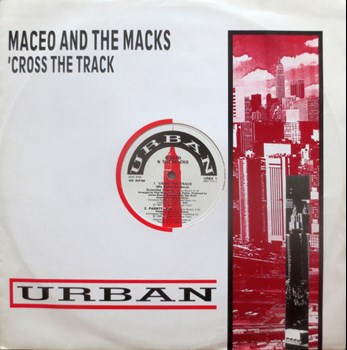
Maceo And The Macks - Cross The Track
By 86 I'd done as much as I could in Liverpool and wanted to move on and heard that Paul Redman was leaving a label called Boiling Point, which was pretty much defunct and it ran its course. I rang him up and said; ‘I understand you're leaving to which he said, yeah. Do you want an interview?’ So he arranged it for me and I travelled down to London for an interview with a woman called Carol Wilson. In the space of the three-hour interview, she offered me the job. My remit was to create a new dance music, club label for Polydor. I started in January 87, and the first thing I had to do was immerse myself in what was happening in London. I'd come from Liverpool where I was a big cheese and I was a big fish in a little pond. I was one of the top DJs in the whole of the Northwest at that time. I was one of the biggest independent promoters and I had to get used to the fact that I was pretty much going to give up DJing for a little while. I got into going out to clubs and I'd be out at clubs five, six nights a week on expenses, which was fine for me. I didn’t come into the office until 12 o'clock after staying out until 3 or 4am in the morning. What was great about it all was that Rare Groove was happening almost in isolation in London and a small area in the southeast where I was going out.
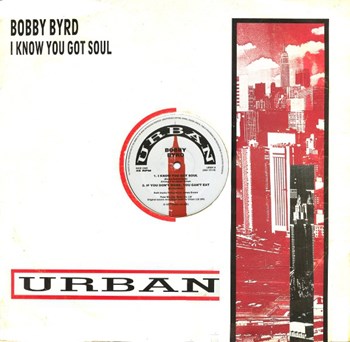
Bobby Byrd - I Know You Got Soul
I spent a couple of months educating myself and I was blessed that, while I was lucky in a way that I'd go to The Wag Club and people would be queuing up to tell me what records I should be releasing. So I used to make a mental note of them and go to the record stores and ask what were the big tracks? They would tell me what was selling and what tracks were being sought after. I came up with the name Urban as it's music that's being played in the inner cities. The big track at the time was Maceo And The Macks - Cross The Track. I reached out to label contacts America and New York and they sent me a microfiche of everything that was available that belonged to PolyGram America that was available in the New Jersey tape store. I hired a microfiche reader and started going through it all and exporting things. I was astonished at what Polydor owned and I got Cross The Track and then Eric B and Rakim released I Know You Got Soul, so I got hold of Bobby Byrd’s I Know You Got Soul. Next was the Jackson Sisters as everyone was talking about I Believe In Miracles.
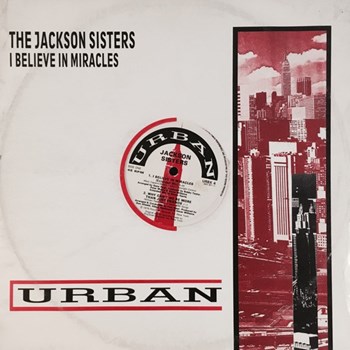
Jackson Sisters - Miracles
These were tracks that weren't really well known outside of London and a small area in the southeast. My biggest job was to break these records and introduce them to the rest of the country. Fortunately there were still specialist Soul and Funk, black music DJs in most of the major cities. I did a lot of promotion and travelled around the country with boxes of records giving them to people. I wish to God, I'd kept boxes of the seven inches because they go for an absolute fortune now. I always tried to put an original and unreleased track on the B side as well as the 12 inch version. I compiled the Urban Classics Volume, One and Two. Maceo’s Cross The Track was my starter - it was my ‘here we go, this is my declaration of intent’. The Jackson Sisters between I know You Got Soul, those are the ones that really established me as somebody who people thought that I had the balls, the drive and the determination and the creativity to make it all happen. I wanted to build a brand identity and I'm still to this day blown away that the Jackson Sisters record is known by probably millions of people now. I'm not saying it's all because of me, but I would say, at least 50% of the people who know about that track are because of my release on Urban. I always used to say that I want to make records, or be involved with records to change people's lives and the people will remember me for something years later and the Jackson Sisters release is one of those records. It is a firm favourite right across the board from high street clubs in Romford right through to House clubs. We were playing it in our House clubs and Carl Cox used to play it.
I was playing House records before I was playing Rare Groove as they were up tempo, they were fast and they fitted in with what I played. I could mix Jack Your Body in with The Communards or Divine as it suited my style completely. I was already aware of House music, which is why I was really surprised when I came to London that so few people knew about it, apart from people like Noel Watson and a couple of other people like Jazzy M who was there for the very beginning. Also Colin Favor and Eddie Richards were there, but for the most part people didn't really know about it. By the time I went to America for the New Music Seminar in '87 I was already aware of House music; but when I got there it’s still all about Hip Hop and Funk and stuff like that.
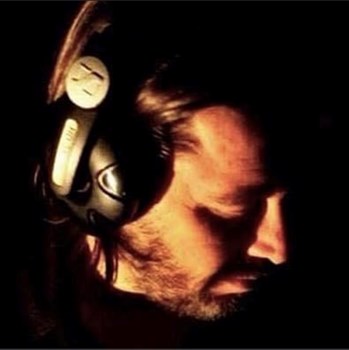
Nightwriters - Let The Music Use You
One day me and Paul Oakenfold went record shopping to Vinyl Mania in New York Village. It’s the first time I’d ever been into a record store where the guy selling the records was a DJ. It was a guy called Manny and I had a stack of maybe 10 records and he'd be playing them. Suddenly these cowbells start and there’s this beautiful baseline, me and Paul just looked at each other and went ‘Yeah!’. We both turned around to Manny and said: ‘We'll have one of those’ and it's the Nightwriters, Let The Music Use You.
It's a beautiful song and the cowbell at the beginning is a riff and a hook in itself. That's a great thing about the 808, you could tune the cowbell and it's no surprise that this is Frankie knuckles. The reason why I've chosen it is because all of the other things I've mentioned, it was unique. Even though I knew about House music, it was so beautifully crafted and so melodic and musical but still with that huge electronic groove. And that beautiful keyboard again, it can't be beaten. I'm in New York having just launched a high profile label with Urban and Rare Groove tracks, and the first record I bought in New York is by Nightwriters. It's one of those records that we bought immediately and it became a big record for both of us. I bought it because I just knew at some point or other I had to have this record because I was going to play it to people.
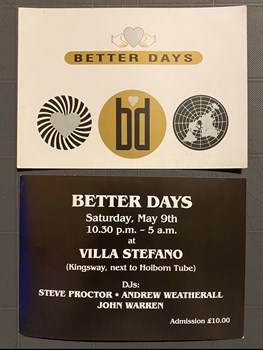
Joe Smooth - Promised Land
When I came back from New York, I was going into City Sounds and Groove Records and asking for House music records. One day, Joe at City Sounds played this record to me and I just said; ‘I've got to have that’. I liked it so much that I named my first Balearic Acid House club, Promised Land after it. I used to do a mix where I used a Martin Luther King’s speech, where he says: I've been to the mountaintop. I've seen the Promised Land. I may not get there with you. But I want you to know tonight, that we, as a people, will get to the Promised Land”. I had that speech, so I used to live mix over the Joe smooth version. Paul Weller heard about it one day when he was making his version with the Style Council and he rang me up to ask if I'd go to the studio and talk to them about it. They wanted me to remix the Style Council version of Promised Land and use the Martin Luther King speech on it, but they wouldn't pay me enough money. So I turned them down. I just got very lucky about how I could find things to put together and been blessed with an innate ability to know how to put records together.
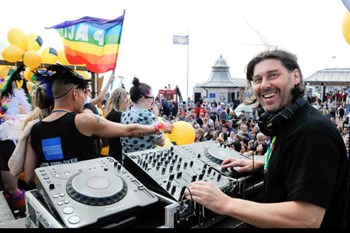
Dan Hartman - Vertigo/Relight My Fire
I described this in my DJ chart in 1988 as a Disco symphony. The version I used to play is the full original Instrumental, from an American promo that I got given in 1983. I got sent a copy by somebody who did promotion at Epic Records and it had already been out for a couple of years. It wasn’t what I was playing at the time. On my nights off I used to go to a gay club in Liverpool. It was pretty much all men and I was friendly with the DJ and I used to hang out with him because he played great music. And one night he played this track and the place erupted which was phenomenal. I said: ‘What is this?’ And he said: ‘It's Dan Hartman, Relight My Fire’, I said, ‘I've just been sent a copy’. He asked me if I wanted to sell it (which I didn’t). And said: ‘If you ever do, I'll get you 20 quid for it’, this was in 1983! About three weeks later I was on holiday in Wales and I found five copies of the album with Vertigo on it. I bought them all for about a pound each and took him down to the club and sold all five for 20 quid each within 15 minutes of announcing them, which was a lot of money in those days.
Fast forward a bit to 1988 and I got the residency at Love at The Wag. We're really into taking Ecstasy by that time and when I'd finished DJing I’d get home and put it on the full instrumental. Vertigo/Relight My Fire but with the Loleatta Holloway vocal at the end of it. I started saying to my wife that I wanted to play this record at the club. And so I got talking with Norman Jay one night and asked; ‘Have you ever heard that Relight My Fire by Dan Hartman? I'm thinking of playing it out at my Acid House sets. Norman replied; ‘You're a braver man than me if you do’. After about five weeks, I came home after Love at The Wag and played it and decided I was going to play it the following week. I had to wait for people to really off their heads, I’d built myself up for it. The promoter of the club came up to me and said: ‘What's this disco shit you're playing?’ I said: ‘Rod, stick with me, please trust me on this one. It's gonna become a classic.’ And so he stuck with me and I played the whole lot, right through and it went off across the whole club. I started playing it around the country like Quadrant Park and the big raves I DJed at. I played it when I started Promised Land and it became my signature tune. I used to get up on the speakers and dance in front of everyone and I'd have all the people dancing back to me. The reason why this is my last record is that it’s a track to finish with but also because I've never had the chance to tell that story before. I was certainly not never the first to play it in clubs because it was being played to death in gay and LGBTQ clubs all around the world. But I know for a certainty, I was the first one to play it on the Acid House scene to the point where within a year, Julian “Jumpin” Perez had released a cover version of it on D.J. International Records, which was nowhere near as good.
Again it goes back and completely sums up everything I've been saying about what I am as a DJ. It's about having a record that is so amazing that you are duty bound as a DJ to share it with other people. I was obliged to play it and felt Intensely driven to play it. I just found I had to work up the courage to do it because it was a massive change. Fortunately, I'd already laid the groundwork as I was already playing a remix of Love Sensation by Loleatta Holloway and was already playing other bits of Disco. My reasoning was that if they'll take eight and a half minutes of Phuture’s Acid Tracks, they'll take 12 minutes of Relight My Fire.
I had to wait until the optimum time where people were on good Ecstasy and had to know how to program the half an hour before that for everybody to be receptive to it. It's all about experience, knowledge and programming, but it's also about having a residency. It goes back to the thing about having a residency where you develop a relationship of trust with people. It's like, I'll give you what you want, If you'll take a little bit of what I think you should have. But it was also hard to mix out because it's a real drummer, it would be more of a crossfade. I know for certainty I would have followed it with an absolute classic or a big track of the time. It was as a reward to say: ‘You've taken it from me, thank you very much. Here's something for you in return.’ That's the quid pro quo about being a DJ and having residency and having a regular crowd to play. Bruce Forest called them ‘The children’. I used to call them the kids as by 1988 I was already 29-years-old.
I always refer to the beginning of the scene in this country as Balearic Acid House, not just Acid House because we weren't just playing Acid House. There weren't enough House records to do a four hour set. I was playing everything from Depeche Mode to Dan Hartman to Acid Tracks. I got given my copy of Acid Tracks by Larry Sherman when I met with him in 87. I could have put that in the list as well. I used to finish some nights with Troglodyte by The Jimmy Castor Bunch and sometimes I’d finish with Rock Your Baby by George McCrae.
I'm still excited by new music. I don't go out as much as I used to, but I still love hearing DJ's playing music that I know but in a way that I would never think about playing. If any DJ is pushing themselves as an individual and introducing people to new music or reminding people of old music that they'd forgotten and having the courage to just to go with it, knowing how to program in such a way that it works. Those are all really the sort of the things that excite me about DJs these days, to me you can be the best mixer in the world and it's easy to be a spot on beat mixer when you're playing the same BPM and the same drum sound for an hour or for 45 minutes. That's why I still have a lot of time for Disco and Rare Groove DJs because it's all about programming. It's all about rhythm, it's all about the groove. You've always got to be true to yourself and you've got to believe in every track that you play. You have to genuinely believe that this is the best track.
Thanks to Steve Proctor for the images of himself and his club night flyers.
Discover new digital dance music with Trackhunter




















